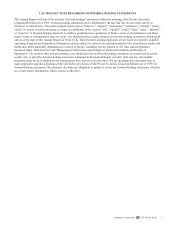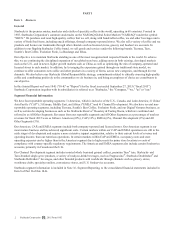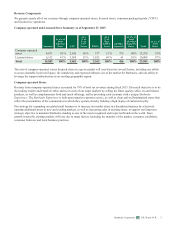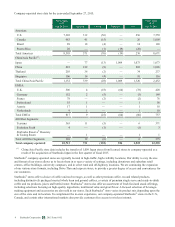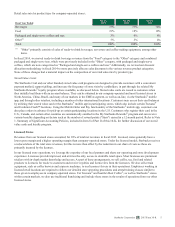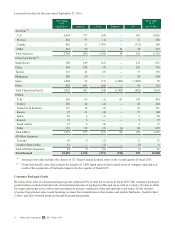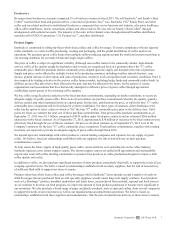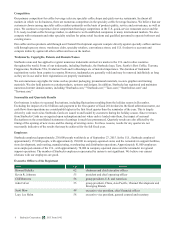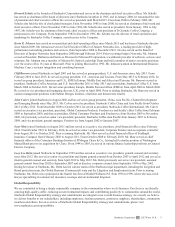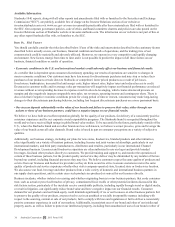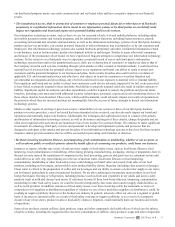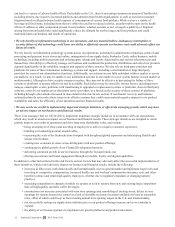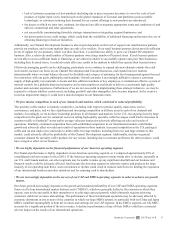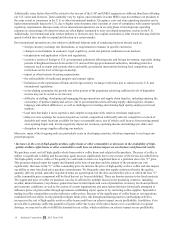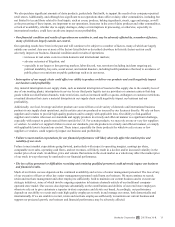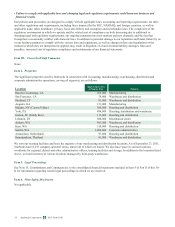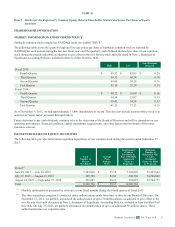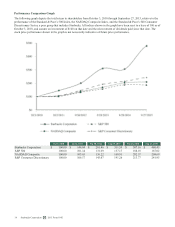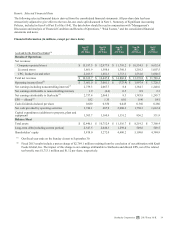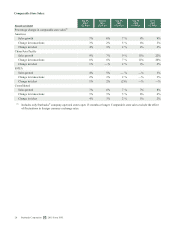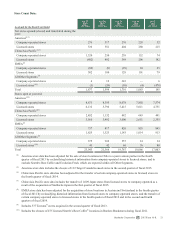Starbucks 2015 Annual Report Download - page 15
Download and view the complete annual report
Please find page 15 of the 2015 Starbucks annual report below. You can navigate through the pages in the report by either clicking on the pages listed below, or by using the keyword search tool below to find specific information within the annual report.
our intellectual property assets, can erode consumer trust and our brand value and have a negative impact on our financial
results.
• The unauthorized access, theft or destruction of customer or employee personal, financial or other data or of Starbucks
proprietary or confidential information that is stored in our information systems or by third parties on our behalf could
impact our reputation and brand and expose us to potential liability and loss of revenues.
Our information technology systems, such as those we use for our point-of-sale, web and mobile platforms, including online
and mobile payment systems and rewards programs, and for administrative functions, including human resources, payroll,
accounting and internal and external communications, as well as the information technology systems of our third party business
partners and service providers, can contain personal, financial or other information that is entrusted to us by our customers and
employees. Our information technology systems also contain Starbucks proprietary and other confidential information related
to our business, such as business plans, product development initiatives and designs. Similar to many other retail companies
and because of the prominence of our brand, we have experienced frequent attempts to compromise our information technology
systems. To the extent we or a third party were to experience a material breach of our or such third party’s information
technology systems that result in the unauthorized access, theft, use or destruction of customers' or employees' data or that of
the Company stored in such systems, including through cyber-attacks or other external or internal methods, it could result in a
material loss of revenues from the potential adverse impact to our reputation and brand, our ability to retain or attract new
customers and the potential disruption to our business and plans. Such security breaches also could result in a violation of
applicable U.S. and international privacy and other laws, and subject us to private consumer or securities litigation and
governmental investigations and proceedings, any of which could result in our exposure to material civil or criminal liability.
Our reputation and brand and our ability to attract new customers could also be adversely impacted if we fail, or are perceived
to have failed, to properly respond to these incidents. Such failure to properly respond could also result in similar exposure to
liability. Significant capital investments and other expenditures could be required to remedy the problem and prevent future
breaches, including costs associated with additional security technologies, personnel, experts and credit monitoring services for
those whose data has been breached. These costs, which could be material, could adversely impact our results of operations in
the period in which they are incurred and may not meaningfully limit the success of future attempts to breach our information
technology systems.
Media or other reports of existing or perceived security vulnerabilities in our systems or those of our third party business
partners or service providers, even if no breach has been attempted or has occurred, can also adversely impact our brand and
reputation and materially impact our business. Additionally, the techniques and sophistication used to conduct cyber-attacks
and breaches of information technology systems, as well as the sources and targets of these attacks, change frequently and are
often not recognized until such attacks are launched or have been in place for a period of time. We continue to make significant
investments in technology, third party services and personnel to develop and implement systems and processes that are
designed to anticipate cyber-attacks and prevent breaches of our information technology systems or data loss, but these security
measures cannot provide assurance that we will be successful in preventing such breaches or data loss.
• Incidents involving food-borne illnesses, food tampering, food contamination or mislabeling, whether or not accurate, as
well as adverse public or medical opinions about the health effects of consuming our products, could harm our business.
Instances or reports, whether true or not, of unclean water supply or food-safety issues, such as food-borne illnesses, food
tampering, food contamination or mislabeling, either during growing, manufacturing, packaging, storing or preparation, have in
the past severely injured the reputations of companies in the food processing, grocery and quick-service restaurant sectors and
could affect us as well. Any report linking us to the use of unclean water, food-borne illnesses or food tampering,
contamination, mislabeling or other food-safety issues could damage our brand value and severely hurt sales of our food
products, including our beverages, and possibly lead to product liability claims, litigation (including class actions) or damages.
Clean water is critical to the preparation of coffee and tea beverages and our ability to ensure a clean water supply to our stores
can be limited, particularly in some international locations. We are also continuing to incorporate more products in our food
lineup that require freezing or refrigeration, including produce (such as fruits and vegetables in our salads and juices), dairy
products (such as milk and cheeses) and meats. If customers become ill from food-borne illnesses, tampering, contamination,
mislabeling or other food-safety issues, we could be forced to temporarily close some stores and/or supply chain facilities, as
well as recall products. In addition, instances of food-safety issues, even those involving solely the restaurants or stores of
competitors or of suppliers or distributors (regardless of whether we use or have used those suppliers or distributors), could, by
resulting in negative publicity about us or the foodservice industry in general, adversely affect our sales on a regional or global
basis. A decrease in customer traffic as a result of food-safety concerns or negative publicity, or as a result of a temporary
closure of any of our stores, product recalls or food-safety claims or litigation, could materially harm our business and results
of operations.
Some of our products contain caffeine, dairy products, sugar and other compounds, the health effects of which are the subject
of public scrutiny, including the suggestion that excessive consumption of caffeine, dairy products, sugar and other compounds
Starbucks Corporation 2015 Form 10-K 11


